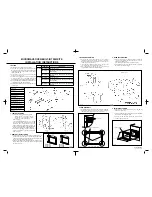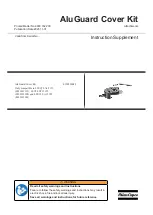
Sensor Configuration
Switches
Switch 1 configures the sensor to op-
erate in either a normal or high sensitiv-
ity mode. Place this switch in the NORM
position for sensing liquid or solid mate-
rials. Place the switch in the HIGH posi-
tion for sensing soft or porous materials
that will absorb some of the ultrasonic
energy.
Switch 2 configures the sensor to op-
erate in either an object or background
sensing mode. Place this switch in the
OBJCT position to perform a sensing
function for receiving the reflected ultra-
sonic energy directly off an object. Place
this switch in the BKGRD position to
perform a break-beam sensing function
for receiving the reflected ultrasonic en-
ergy directly off a fixed background tar-
get.
Switch 3 selects the operating mode
for the sensor output to be either nor-
mally open (N.O.) or normally closed
(N.C.).
Switch 4 configures the sensor to per-
form either a slave or master operating
function. See Synchronized Sensing and
Gate-controlled Sensing descriptions for
selecting the proper switch position.
Control Compartment
A unique feature available to the user
of these sensors is the ability to quickly
set up each sensor for a specific appli-
cation. The sensor is configured through
four slide switches and a push-button
Synchronized Sensing
S
ynchronized sensing is a unique fea-
ture of this sensor that enables reliable
“curtain” sensing or inspecting over a
wide area by using multiple sensors in
a set. Synchronized sensing allows
these sensors to be operated close to-
gether, thus eliminating any possible
adverse ultrasonic signal interference
between the sensors.
Any number of these sensors can be
operated together to perform a synchro-
nized sensing function. It is accom-
plished by simply connecting together
the external control wire lead from all
the sensors in the set as shown in the
illustration on the next page. One of the
connected sensors must operate with
setup Switch 4 in the “Master” position
and the other connected sensors must
operate with setup Switch 4 in the
“Slave” position. The designated “Mas-
ter” sensor continuously synchronizes
the transmit and receive cycles of all
the connected sensors as a result of
this configuration.
Figure 1
12
34
NORM
OBJCT
N.O.
SLAVE
HIGH
BKGRD
N.C.
MASTER
LIMITS
Model Reference Guide - SM504 Series
Use the guide below to ensure the correct model number is specified for the
application. Please note that not all sensor model combinations are available.
EXAMPLE MODEL: SM5 5 4 B - 4 00 - AF
SUPERPROX
®
Product Series
Power/Connection Type (DC only)
0...12 to 24 VDC / cable style
5...12 to 24 VDC / connector style
Sensing Function
4...Proximity - Synchronized/Gate-controlled
Design Level
A…Applies to discontinued models with NPN sinking output only
B…Applies to models with NPN sinking and PNP sourcing outputs
Sensing Range
0...51 to 635 mm (2 to 25")
1...51 to 1 m (2 to 39")
4...120 mm to 2 m (4.7 to 79")
Functionality
00...Standard Proximity
05...Default Window: ±0.5"
44...Default Window: ±0.1"
67...Switch selectable, 1 or 2 echo hit recognition with high gain
Special Features
...No letter indicates standard sensor with no special features
FS...Fluorosilicone transducer face
AA...Remote limit setup (Available on DC cable models only.)
AB...RS232, 4-digit/2-decimal place output (Available on cable models only.)
AD...Limits push-button disabled
AE...RS232, 5-digit/3-decimal place output (Available on cable models only.)
AF...No LEDs
Housing Types
...No letter indicates standard ULTEM
®*
plastic housing
N...NORYL
®*
Dairy 3A gray plastic housing
Remote Type
...No letter indicates standard couopler
R...Right-angle sensing head with armor cable
S...Straight sensing head with armor cable
Remote Cable Length
...No number indicates standard coupler
1...254 mm (10")
2...508 mm (20")
5P...1270 mm (50")
3...762 mm (30")
6P...1524 mm (60")
4...1016 mm (40")
* ULTEM
®
and NORYL
®
are registered trademarks of The General Electric Company.
4-48
Available in PVC cable only
Armored (standard) or
PVC cable (specify P
after number)
(
See Figure 1) located inside a wa-
ter-tight control compartment on the
sensor. To access the controls, remove
the small square cover on the back of
the sensor. Simply loosen the two flat-
head cover screws and insert a small-
blade screwdriver in either the top or
bottom slot to remove the cover. A short
plastic tether prevents separation of the
cover from the sensor. NOTE: The
switch settings may require changing
for the intended application.
Rugghölzli 2
CH - 5453 Busslingen
Tel. +41 (0)56 222 38 18
Fax +41 (0)56 222 10 12
www.sentronic.com
Produkte, Support und Service
SENTRONIC
AG
























